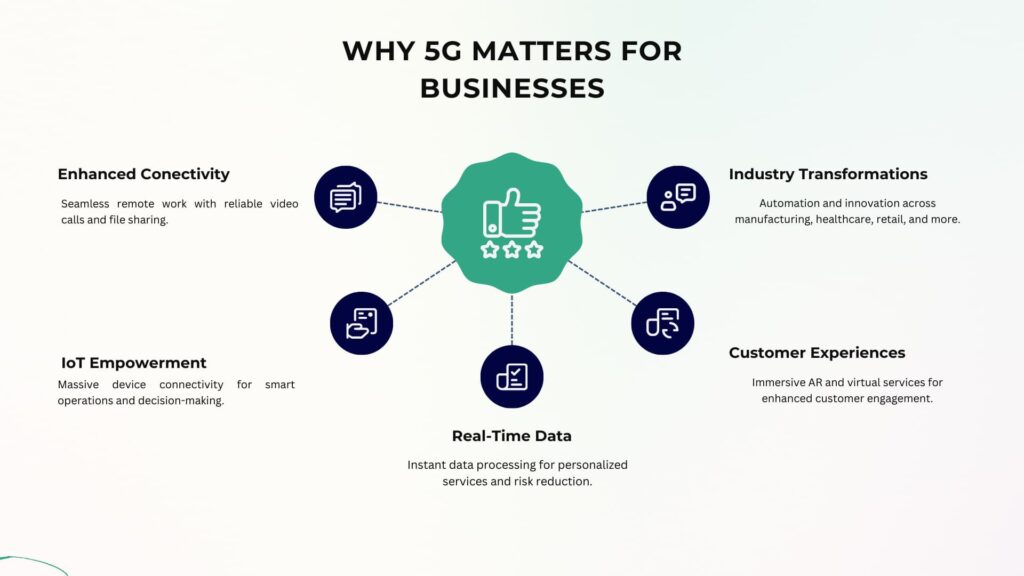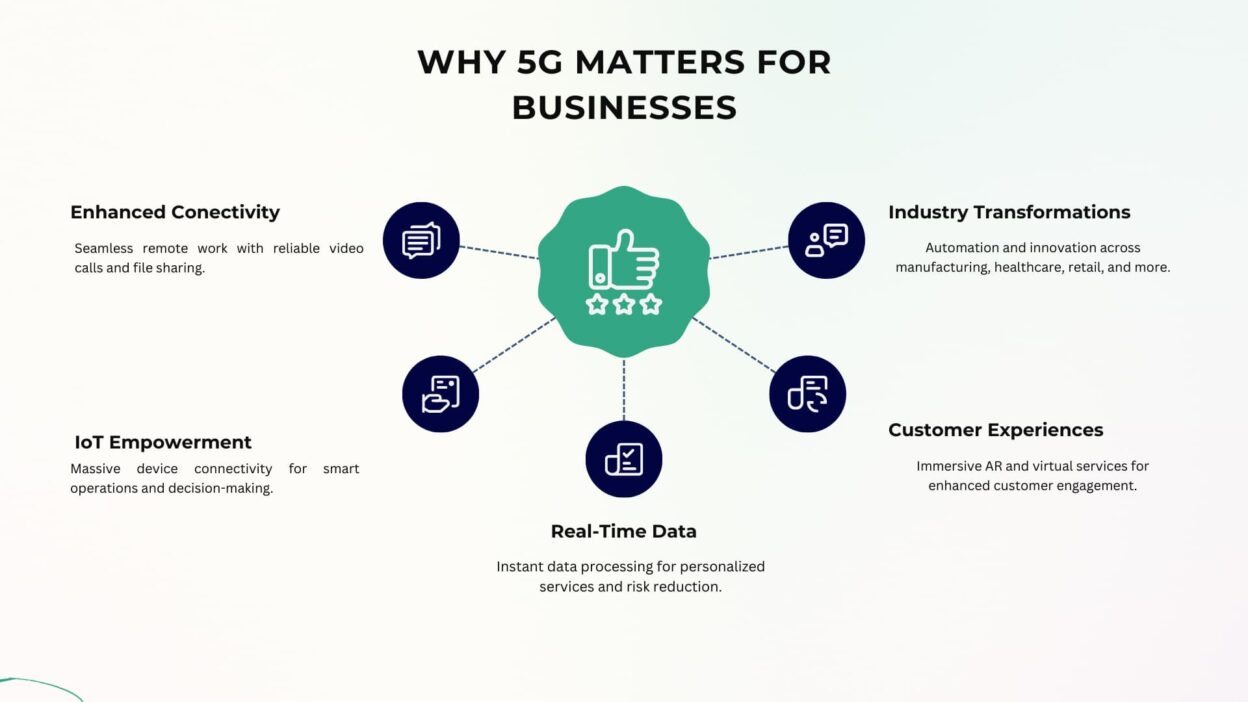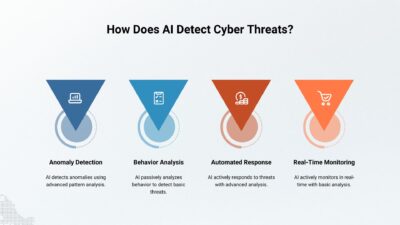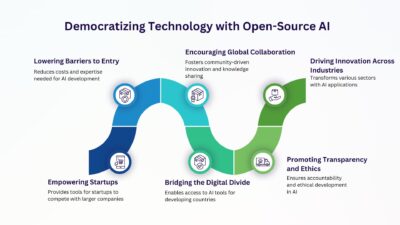Technology has always been the driving force behind business innovation. From the early days of dial-up internet to the rise of 4G networks, each leap in connectivity has transformed the way we work, communicate, and create value. Now, 5G—the fifth generation of mobile networks—is taking center stage.
But 5G is more than just faster internet on your phone. It’s a catalyst for digital transformation across industries, reshaping everything from how companies operate to how consumers experience products and services. For business leaders, entrepreneurs, and freelancers alike, understanding the evolution of 5G and its impact is key to staying competitive in the years ahead.
In this blog, we’ll explore how 5G has evolved, why it matters for business, and what opportunities it creates in a connected world.
What Is 5G?
5G, or fifth-generation wireless technology, is the successor to 4G LTE. It’s designed to deliver:
- Faster speeds: Up to 100 times faster than 4G.
- Ultra-low latency: Reducing delays in data transmission to just a few milliseconds.
- Massive device connectivity: Supporting billions of IoT (Internet of Things) devices simultaneously.
- Improved reliability: Ensuring stable, high-quality connections even in crowded areas.
These improvements aren’t just technical upgrades—they unlock entirely new ways for businesses to operate, innovate, and deliver value to customers.
The Evolution of 5G Technology
The journey of 5G didn’t happen overnight. It’s the result of decades of research, testing, and incremental improvements in wireless communication.
1G to 4G: Laying the Groundwork
- 1G (1980s): Analog voice communication.
- 2G (1990s): Digital voice and SMS messaging.
- 3G (2000s): Mobile internet and video calls.
- 4G (2010s): High-speed mobile broadband enabling streaming, apps, and the rise of mobile-first businesses.
Each generation set the stage for the next. 4G allowed services like Uber, Netflix, and mobile banking to thrive. But it wasn’t built for the scale of smart devices, autonomous systems, and immersive digital experiences that businesses are moving toward.
The Arrival of 5G
5G rolled out commercially around 2019–2020. Early deployments focused on speed boosts for consumers, but businesses quickly realized its potential. As networks expand globally, 5G is evolving from a buzzword into a critical business enabler.
Why 5G Matters for Businesses

For companies and entrepreneurs, 5G isn’t just about upgrading smartphones. It’s about building smarter systems, reducing operational costs, and creating better customer experiences. Let’s break down its business impact.
1. Enhanced Connectivity for Remote Work
The pandemic proved the value of flexible work. With 5G, remote work gets an upgrade—seamless video calls, faster file sharing, and cloud-based collaboration without lag. Freelancers and distributed teams benefit from improved reliability, making location less of a barrier.
2. Empowering IoT and Smart Devices
5G supports massive device connectivity, which fuels IoT adoption. Businesses can deploy sensors in factories, track logistics in real time, or even monitor customer usage patterns through connected products. This means smarter decision-making and optimized operations.
3. Real-Time Data and Analytics
Low latency allows businesses to act on data instantly. For example:
- Retailers can personalize offers in real time.
- Financial services can reduce risks with instant fraud detection.
- Healthcare providers can monitor patients remotely with zero lag.
4. Better Customer Experiences
From AR-powered shopping experiences to virtual customer service, 5G creates immersive ways to engage audiences. Businesses that embrace these innovations gain a competitive edge in customer satisfaction and loyalty.
5. Industry-Specific Transformations
- Manufacturing: Automation, robotics, and predictive maintenance.
- Healthcare: Telemedicine, remote surgery, and connected devices.
- Retail: Smart checkout systems and personalized in-store experiences.
- Logistics: Real-time tracking and efficient fleet management.
- Entertainment: High-quality streaming, e-sports, and VR experiences.
The Business Benefits of 5G
Businesses adopting 5G-enabled solutions are already seeing tangible benefits. Some key advantages include:
- Increased efficiency: Faster networks streamline workflows.
- Cost savings: Real-time monitoring reduces waste and downtime.
- Innovation opportunities: Opens doors to new products and services.
- Scalability: Handles growing data and device demands.
- Global competitiveness: Early adopters position themselves as leaders in their industries.
Challenges Businesses Must Consider
While the benefits are clear, 5G adoption also comes with challenges that businesses must prepare for.
- Infrastructure Costs: Building 5G networks requires significant investment. Small businesses may rely on shared services or partnerships.
- Cybersecurity Risks: More connected devices mean more vulnerabilities. Strong cybersecurity measures are essential.
- Technology Integration: Legacy systems may not easily integrate with 5G-enabled solutions. Businesses need clear migration strategies.
- Uneven Availability: Not all regions have widespread 5G access yet, which can limit adoption for global companies.
The Role of 5G in Digital Transformation
Digital transformation isn’t just about adopting technology—it’s about rethinking how businesses operate in a connected world. 5G acts as the backbone of this transformation by:
- Enabling automation across industries.
- Facilitating real-time decision-making with instant data.
- Supporting new business models, such as subscription-based IoT services.
- Driving innovation ecosystems, where startups and enterprises collaborate using shared 5G platforms.
The Freelancer and Small Business Perspective
While much of the 5G conversation focuses on enterprises, freelancers and small business owners also stand to benefit.
- Faster Uploads & Downloads: Essential for designers, video editors, and content creators.
- Seamless Client Communication: High-quality calls and instant file transfers improve client satisfaction.
- Access to Cloud Tools: 5G makes advanced cloud software more reliable, reducing the need for expensive local setups.
- Competitive Edge: Early adoption signals professionalism and adaptability to clients.
Future Outlook: What’s Next for 5G?
The evolution of 5G is just beginning. As the technology matures, businesses can expect:
- Wider Global Coverage: Expanding access to rural and underserved regions.
- Integration with 6G Research: While 5G adoption grows, early research into 6G is already underway, promising even greater possibilities.
- AI and 5G Synergy: AI-driven automation will thrive on 5G’s real-time capabilities.
- Sustainable Connectivity: More energy-efficient networks will support eco-friendly business practices.
- Cross-Industry Collaboration: Businesses will partner more often, using 5G as a shared platform for innovation.
Practical Steps for Businesses Adopting 5G
If you’re a business owner, freelancer, or entrepreneur, here’s how to prepare for the 5G era:
- Evaluate your needs: Identify areas of your business that would benefit most from faster connectivity.
- Upgrade infrastructure: Invest in 5G-ready devices, routers, and software.
- Prioritize cybersecurity: Strengthen defenses for your connected systems.
- Explore partnerships: Collaborate with telecom providers, tech companies, or coworking hubs offering 5G-enabled services.
- Stay informed: Keep up with industry trends to spot new opportunities early.
Conclusion
The evolution of 5G represents more than just a technological milestone—it’s a business revolution. By combining speed, reliability, and massive connectivity, 5G is enabling industries to innovate, freelancers to compete globally, and organizations to operate more efficiently than ever before.
For businesses of all sizes, the message is clear: the future is connected, and 5G is the backbone of that future. Those who adapt quickly will unlock new opportunities, build stronger customer relationships, and gain a long-term competitive edge.



